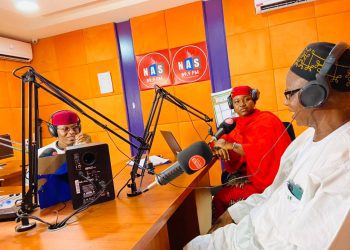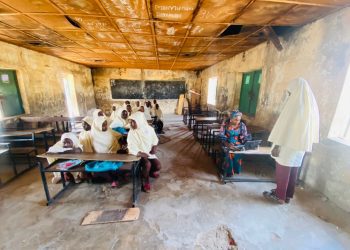For the past centuries, some discriminatory societal norms and conservatism strengthened the belief of many parents from Northern Nigeria in early marriage amongst girls.
Girls on reaching the puberty stage, are forced into matrimonial homes, rather than a classroom.
By studies, Issues of gender discrimination and harmful cultural practices are common in some parts of Adamawa state, as they deprived many young girls of access to secondary education. Similarly, such practices also deny them the freedom to enjoy equal rights with their male counterparts.
In such communities, women are known for carrying out house chores as well as giving birth to children. Sadly, when it involves decision-making, they have no privilege to participate. Hence, they cannot influence anything or have a voice to echo the tones of freedom.
According to a report by Malala Fund, girls account for 60 percent of Nigeria’s 10 million out-of-school children, facing barriers such as child marriage, poverty, and discriminatory social norms. In some parts of Nigeria, 30 percent of girls aged 9-12 have never been to school at all.
In response to this problem, the Centre For Advocacy, Transparency & Accountability Initiative (CATAI), received funding from Malala Fund, to implement the “Educate A Girl” project, which aims to promote increased funding of public education through sustained Civil Society led (CSO)-led advocacy and stakeholders engagement, to promote the girl child’s access to gender-responsive secondary education and life skills.
More so, it is also aimed at addressing social norms and gender barriers to the girl child’s enrollment and completion of secondary education in Adamawa state.
In the past, some organisations worked towards addressing the barriers faced by the girl child in access to secondary school education, but CATAI proves to be unique with this particular intervention due to the contextual knowledge of North-Eastern Nigeria that it accommodates. This informs why the project targets three local governments in Adamawa state – Yola South, Mubi, and Fufore.
“We have a vast knowledge of how the insurgency in the region has affected young girls who are within the age of primary and secondary education,” said Abubakar Sadiq Mu’azu, the executive director of CATAI.
The initiative has learned that some of the factors that hinder enrollment do not only revolve around societal or cultural norms but also the lack of good governance.
“Through that, we seek to address the challenges experienced by young girls in regards to having access to quality education up to secondary school level and bring about reforms by engaging with policy and decision-makers across the state to make them realize why such issues need to be changed,” Mu’azu explained.
There are many ways through which the response works, but to ensure that its impact has spread widely within the targeted communities, a radio program “Rubutun Kan Dutse” produced in Hausa is being played weekly at a local radio station in Yola.
“We have two segments; the first is the radio drama (GANGARE), where we talked about the social norms and gender barriers and how they affect girl child education. The play was written in a way that will capture the minds of out-of-school girls and make them develop interest to enroll in school,” Hauwa Bukar Kumshe, the project coordinator explained.
The second segment features discussions with stakeholders from the Ministry of Education, teachers, and community heads.
“We gather to discuss the factors that hinder the girl child from enrollment and retention in school up to secondary education. We try to come up with strategies that can help to tackle the problem. We also sensitize parents who don’t enroll their daughters in school – showing them the importance of enrolling the girl child in school,” Kumshe said.
In one of the radio sessions, Alhaji Umar Aminu, the executive secretary of the Adamawa State Agency for Mass Education Board (ADSAMEB) discussed with the project team the efforts they are putting in to provide adequate classes, quality teachers, and materials that will promote quality education among young girls who are most affected by conflicts.

“ADSAMEB is ready and determined to address the challenges that prevent vulnerable children from accessing quality education,” said Alhaji Aminu.
The radio program is serving its purpose as people from neighbouring Taraba, Gombe, and Borno are tuning in to ask questions and even make suggestions that centred around girl child enrollment in schools.
It is enlightening for 38th-year-old Ahmadu Musa, who expressed how the program is not only convincing him to enroll his children but also giving him the need to go back to school himself. He explains how he is faced with challenges as a result of his failure to attend school when he was young.
Many parents like Musa are being reignited with the feeling of going back to school and even enrolling their daughters as a result of CATAI’s intervention.
For instance, Shehu Janyi, another parent, has a feeling that even in schools, his children would be able to adapt to sound moral upbringing while accessing quality education.
“I am advising my fellow parents to give a project like this maximum support in seeing that our daughters have access to quality education,” Janyi said.
To Mallam Jibrilla Isa “it is very important to send children to school, especially in these times that we are now.”
Even before CATAI kick-started the project in Adamawa state, Mallam Isa had enrolled his children in school already, so with this awareness and support knocking at their doorsteps, he felt even more confident to move the train of the project to success.
Some individual and community leaders are giving their maximum support to see that the project continues to be a successful one. But the challenge lies within some of the communities around Fufore, where most of them are not cooperative enough.

They have refused to give the project team accurate figures and ages of children who are out of school. The few times they went there, the parents and community head kept telling them to leave, claiming that they didn’t need any support from non-profit organisations.
“The children are not always around. You only find them hawking on the streets. Even the teachers at the school we visited are not trying to make our work easier. They feel relaxed and not energetic enough to help us survey the in-school children,” said Kumshe, the CATAI official.
Mrs. Justina Pwanedo, is the Headteacher at Mbachure Nursery and Primary school, Jimeta. She emphasised the creation of awareness to help tackle the problem.
“Schools should be built where girls can access them easily and teachers should receive adequate training on gender awareness.”
She also concludes that making fewer house chores for in-school girls will enable them to have convenience for studies.
However, Mrs. Justina Pwanedo, who has been a teacher for decades, called on the state legislature to pass bills that will protect the rights of girls and women in the state.
The executive director of the CATAI, Mu’azu expressed optimism that the project will be sustainable as they had taken appropriate channels in strengthening the capacities of Community-Based Organisations (CBOs) and individuals.
He believes it will give the CBOs the confidence to satisfy and meet the needs of the project. Their collaboration with local media outlets in Adamawa state are also paramount to making a wider reach and yielding better results.
“We are expecting that the Civil Society Organizations we are partnering with and the people we trained within the target communities will be the ones to engage with the stakeholders and government in ensuring that young girls have access to quality education up to secondary school level,” he said.
This story has been made possible by Nigeria Health Watch with support from the Solutions Journalism Network, a nonprofit organization dedicated to rigorous and compelling reporting about responses to social problems.

